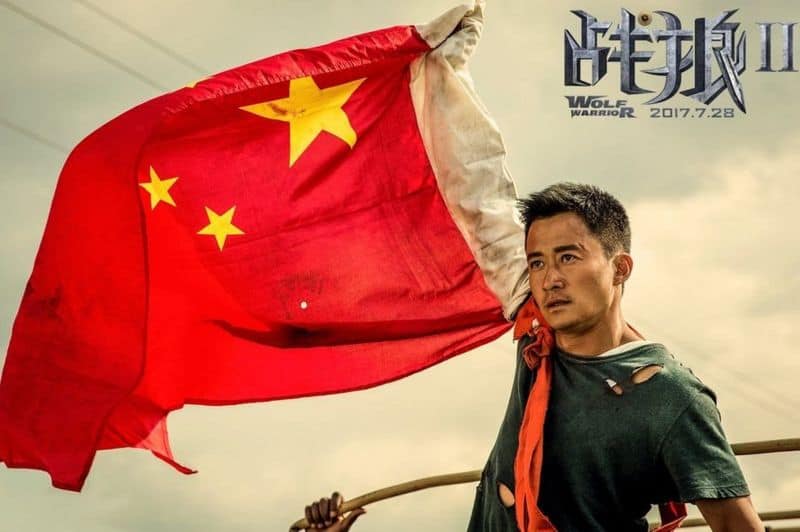
Credit: Wolf Warrior 2
With the government maintaining its chokehold on the coronavirus, there are a lot of things that people in China were able to do that Americans couldn’t in 2020. One of those prized activities was going to the movies.
And as a result, for the first time, China had the world’s biggest box office market in 2020, a year that saw global revenues fall to less than a third of their 2019 peak.
Analysts had predicted that China would soon overtake the United States as the world’s biggest film market, with a 2017 Deloitte report even foreseeing 2020 as the year that the two countries would swap the No. 1 and 2 slots. But with the pandemic dampening ticket sales, it’s not clear how long that will last. Paul Dergarabedian, a senior analyst at Comscore, expects that North America will likely retake the throne as the biggest box office market again soon — though perhaps not in 2021, if the pandemic lingers in the United States and Canada.
Even before its breakout performance last year, China had become a box office power. Though films made in China rarely succeed internationally, foreign films — especially Hollywood film franchises — can pull in huge earnings at the Chinese box office. Indeed, talk about pirated DVDs and IP theft in the film world has largely disappeared as Hollywood has cashed in on the China booming film market.
And yet Hollywood’s efforts to cater to Chinese audiences, and its government censors, has drawn condemnation from American critics and free speech advocates. A PEN America report last August found that U.S. film studios are “changing the content of films intended for international—including American—audiences; engaging in self-censorship; agreeing to provide a censored version of a movie for screening in China; and in some instances directly inviting Chinese government censors onto their film sets to advise them on how to avoid tripping the censors’ wires.”
This week, The Wire looks at the global box office and China ascendance as a movie-going powerhouse. We also zero in on the corporate ownership structure behind one major production house: the Bona Film Group.
The Global Perspective

Two major factors are reshaping the global film market. First, China’s domestic film market is now dominated less by Hollywood than it is by films produced by the country’s own studios. Even though Beijing has long placed restrictions on the number of foreign films that can be released in the country, locally produced films have accounted for about 60 percent of the total box office take for some years. As indicated in the chart above, that figure shot up to 84 percent during the pandemic. Comscore analyst Dergarabedian largely attributed the shift last year to the dearth of U.S. films with wide appeal, like a Marvel film or a movie from the “Fast & Furious” franchise.
The domestically produced movies are also, as many have noted, increasingly patriotic. The China Film Administration, the main regulatory body for films in China, has kept out films — or censored films — that don’t meet its standards and at times explicitly pushed for “blockbusters with Chinese characteristics.”
The other factor reshaping the world’s film market is the sheer importance of China as a producer of films. In 2012, it accounted for about 8 percent of the global market. Last year that figure was 25 percent, meaning that China is on the cusp of being the single largest film market in the world, and therefore an even more important market for Hollywood but also a force in its own right as a producer of domestic films and a financier of Hollywood films.

Highest Earners
Appetites for domestic films, so far, does not appear to be slowing down. Two films released in 2021 have already soared to become some of China’s highest-grossing films of all time, and they’re still climbing. The comedy “Hi, Mom,” released in mid February, has already raked in more than $780 million, according to IMDB’s Box Office Mojo, making it the second-highest grossing film of all time in China. It may yet overtake the 2017 hit “Wolf Warrior II,” which took in $854 million.
Franchise films are the biggest draws for foreign films in China’s box office. “Avengers,” “Fast and Furious” and “Transformers” movies have all performed well in recent years.1One notable exception is Star Wars, a franchise that holds little to no interest for Chinese audiences. The last three “Fast and Furious” films even took in more revenue in China than the United States. The only foreign film that breaks China’s all-time top ten is “Avengers: Endgame,” part of the Marvel franchise.
Consumers and analysts have asked the same question in reverse: how much appeal do Chinese movies hold abroad? The answer, for now, seems to be not too much, with low revenues for Chinese films that show internationally. But the budding world of co-productions could change that, as Chinese production companies have started backing major international movies like “Mission: Impossible—Fallout,” “The Meg,” “Jurassic World,” and the 2016 “Jason Bourne” film.
But another question follows: do China’s movies even need the international market? “Wolf Warrior II,” for instance, was the seventh-highest grossing film of 2017, according to Box Office Mojo, falling behind only American franchise movies like “Star Wars VIII” and remakes like the live-action “Beauty and the Beast.” But, perhaps most notably, only a few million dollars of “Wolf Warrior II”’s total gross came from outside of China. No more than half of the revenues of any of the higher-grossing American films came from just the United States. But China’s domestic market accounted for 98 percent of “Wolf Warrior II” sales. China’s hits don’t need to make it big anywhere else to make it onto the global scoreboard.

Data: Box Office Mojo
The Bona Film Group
The Bona Film Group is one of the studios jumping at the opportunity for international film production. Founder Yu Dong was an executive producer on Quentin Tarantino’s “Once Upon a Time… in Hollywood,” and Bona Film had a hand in American titles like “The Martian,” “The Greatest Showman,” and “Alien: Covenant.” The studio also helped finance Wong Kar-wai’s “Grandmaster” and “Wolf Warrior II.”
Bona has a long, interesting history. The company, also known as PolyBona Film Distribution, began as a private operator before it was acquired in 2003 by China Poly Group, an affiliate of the People’s Liberation Army. Later, it listed on the Nasdaq Stock Market and was 20 percent owned by 21st Century Fox.2Fox later sold its stake back to the founder Yu Dong.
In 2016, however, the company was taken private by a consortium of investors, including Alibaba and Tencent. It also is partly owned by the billionaire Xie Zhikun, and even the actress Zhang Ziyi. Also, Dalian Wanda3Read The Wire’s coverage of Wanda’s financial troubles here. owns a nearly 2 percent stake in the company, according to WireScreen. Below is a detailed chart of the company’s ownership structure.


Hannah Reale is a staff writer with The Wire. Previously, she reported for the GBH News Center for Investigative Reporting, The West Side Rag, and her college newspaper, The Wesleyan Argus. @hannahereale



